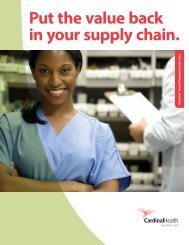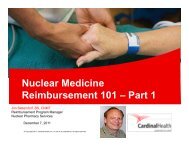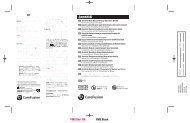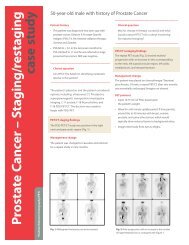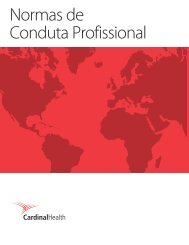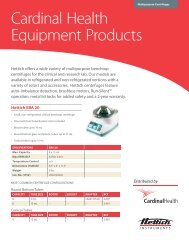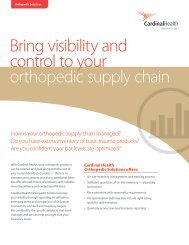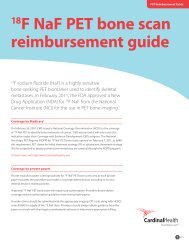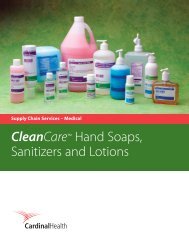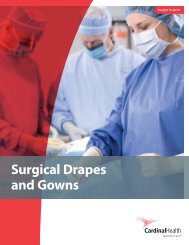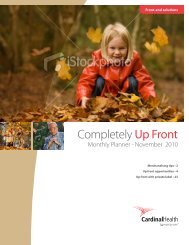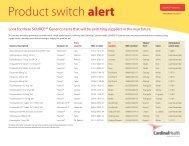Completely Up Front - Cardinal Health
Completely Up Front - Cardinal Health
Completely Up Front - Cardinal Health
You also want an ePaper? Increase the reach of your titles
YUMPU automatically turns print PDFs into web optimized ePapers that Google loves.
2<br />
up front MERCHANDISING TIPS<br />
May 2012 Women’s <strong>Health</strong> – vitamins, supplements and minerals<br />
A commonly asked question is, “what kinds of health products<br />
should a woman use every day for optimum wellness?” While<br />
vitamins, minerals and supplements are no substitute for<br />
medicines or medical care, they can still play a major role in<br />
many women’s health issues.<br />
Women typically diet, which may lead to gaps in their<br />
nutritional balance. Most experts will recommend food as<br />
the best source of vitamins because the body may use<br />
food-sourced vitamins and minerals more efficiently<br />
than other supplements. Women are the main<br />
consumer and purchaser of vitamins for households<br />
consuming vitamins, minerals and supplements.<br />
Women’s needs vary depending on their age,<br />
or whether they are pregnant, nursing, or<br />
menopausal.<br />
A woman typically needs 1,000 to 1,500 mg. of<br />
calcium daily. This can be done through dairy products,<br />
preferably fat-free, drinking pure orange juice fortified with<br />
calcium, or by taking supplements. As women age, their<br />
bone density decreases and this leads to osteoporosis.<br />
Calcium helps to fortify the bones.<br />
Vitamin D enables a woman’s body to use calcium. As a<br />
woman ages this ability decreases which leads to vitamin<br />
D deficiencies. Natural sunlight is a great source of vitamin<br />
D; however, we have learned excessive exposure<br />
to the sun’s rays will damage the skin. A woman<br />
over 50 requires 400 IU daily of vitamin D and a<br />
woman over 70 requires 600 IU daily of vitamin D.<br />
Young women need iron in their system to<br />
defend against anemia. Good food sources<br />
include meats, poultry, beans, eggs and tofu.<br />
Please note to include foods rich in vitamin C<br />
along with iron, because vitamin C helps with iron absorption.<br />
Multiple vitamins for women over 50 usually do not include iron.<br />
Supplements that support cell health, such as Beta-carotenes,<br />
or other antioxidants, help defend a woman’s body against cell<br />
damage. A woman needs to include in her diet foods rich in<br />
COMPLETELY UP FRONT<br />
antioxidants like carrots, apricots, papaya,<br />
cantaloupe, pumpkin, sweet potatoes, and<br />
mangoes. Think orange or deep yellow. If<br />
a woman is not getting enough of these<br />
foods in her daily diet, then a supplement<br />
is the answer to her needs.<br />
Folic acid, vitamins B6 and B12 are all<br />
important for women’s health. Childbearing<br />
or nursing women need folic acid<br />
to help ensure healthy children. Foods<br />
Sheila Weiss<br />
rich in folic acid are orange juice, beans,<br />
Category Manager<br />
and green vegetables. Vitamin B12, like<br />
vitamin D, is not processed as well by older<br />
women. This, along with<br />
vitamin B6, is very important as women age.<br />
Vitamin B6 helps with red-blood formulation<br />
and B12 helps with nerve cell and red-blood<br />
cell development. This process slows down as<br />
a woman ages, so to ensure these beneficial<br />
processes, a supplement is encouraged.<br />
Omega-3 fatty acids have been shown<br />
to act like a natural anti-inflammatory<br />
substance in the body. It is also believed<br />
they may help to promote a healthy<br />
heart. As estrogen declines with age,<br />
a woman’s heart health becomes<br />
a greater concern. Fatty fish, like<br />
salmon and tuna, is a great source<br />
of omega-3. Taking fish oil capsules<br />
is an excellent way to make sure a<br />
woman gets what is required of these<br />
important fats.<br />
It is important to ensure, when buying<br />
vitamins, minerals and supplements,<br />
that the product is made by a Good<br />
Manufacturing Compliance (GMP)<br />
compliant company. Check to see if the<br />
label is United States Pharmacopeia (USP),<br />
or Dietary Supplement Verification Program<br />
(DSVP) approved. Also, only buy standardized<br />
extracts. This will ensure a woman is getting<br />
true potency of the vitamins and herbs.<br />
Experts agree it is important to “supplement”<br />
your daily needs. Vitamins, minerals and<br />
supplements are a good way to fill in the gaps<br />
that a daily diet does not provide.<br />
Sources: “Vitamins for Women: What to Take and When,” Chris<br />
Iliades, M.D., Everyday <strong>Health</strong>.com, Women’s <strong>Health</strong> Center<br />
“Women’s <strong>Health</strong> Supplements,” Editors, Women’s <strong>Health</strong><br />
Questions.com, Women’s <strong>Health</strong><br />
Written by Sheila Weiss<br />
All products may not be stocked in all distribution centers



